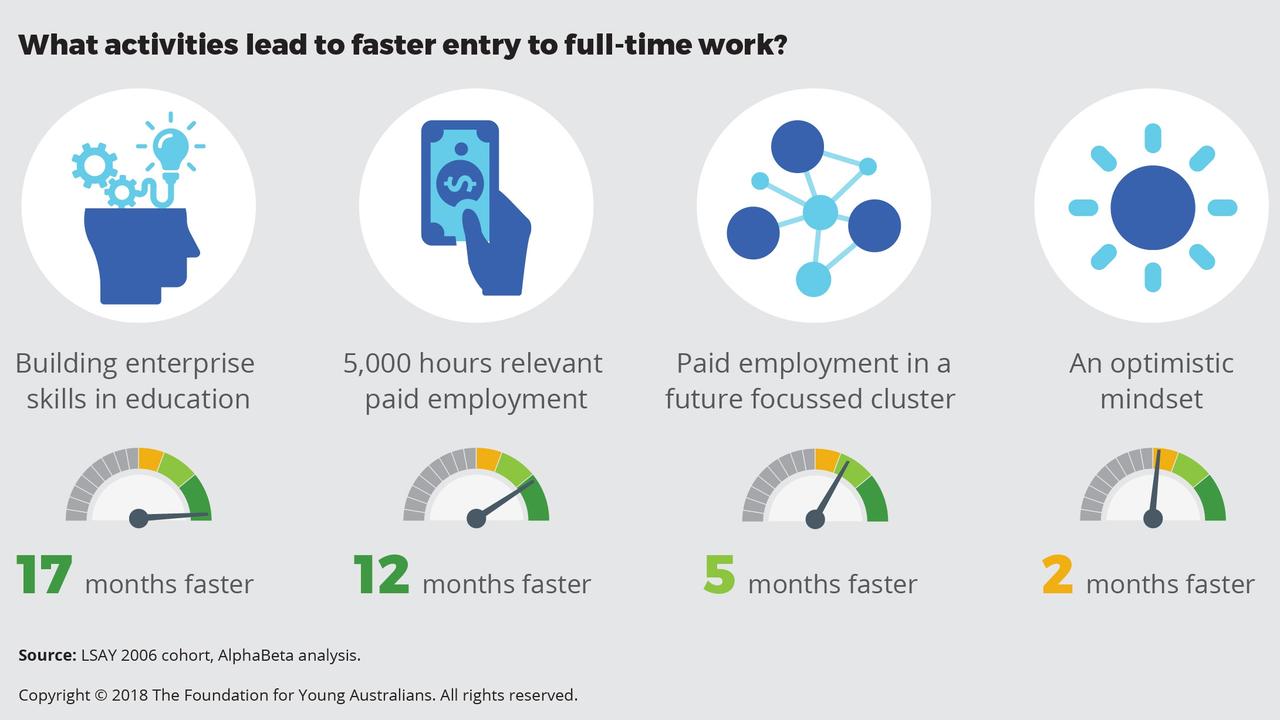Study reveals the struggle of young Australians to find full-time work
WITH more and more young Australians struggling to find full-time work, the jobs that are “future proof” have been revealed.
AS A young law graduate, Tia Mitsis had dreams of being a barrister and helping people in need.
But after searching for a job for almost 10 years, she finally gave up.
While Ms Mitsis was able to find work in an unrelated field, many of her fellow students have not been as lucky.
A report released today revealed 50 per cent of those aged between 15 and 25 years old who had finished their studies and were looking for work, were not working full-time (35 hours or more).
Of those that were working full time, 21 per cent had casual jobs and 18 per cent had multiple jobs.
The latest report for the Foundation for Young Australians (FYA) revealed it now takes about 4.7 years on average for students to transition from education to work. Back in 1986 it only took one year.
Even taking into consideration the popularity of travel, gap years and part-time education, the report found it still took an average of 2.6 years to make the transition.
This is despite the fact that young people are more educated than ever — with more than 60 per cent holding post-school qualifications.
“Australia’s promise to our young people has been that their education is the ‘golden ticket’ to a full-time job. Over the past decade however, that promise to the next generation has been broken as Australia is failing to stay responsive and relevant in a rapidly changing world,” FYA chief executive officer Jan Owen said.
“We have to work together now to rethink, reinvigorate and modernise our learning systems so they support young people to develop the skills, mindset and confidence this new work reality demands.”
It’s been estimated the high numbers of unemployed or underemployed young Australians is costing the economy about $15.9 billion in lost gross domestic product (GDP).

The New Work Reality​ report revealed young Australians increasingly face a number of significant barriers when seeking full time jobs. It has also identified factors that appear to help some get into work faster. ​
The most recent findings are based on data collected in 2016 from a group of 14,000 young people aged between 15 and 25 years old, who graduated in 2006.
About 75 per cent of these students said they didn’t think they had the relevant vocational and practical work experience, while about 70 per cent thought there wasn’t enough jobs. About a quarter didn’t think they had the necessary interview and job application skills.
The difficulty finding work can come as a shock for many students.
Ms Mitsis said she was shocked at how few opportunities there were when she graduated from a law/journalism degree at Griffith University in 2006.
“I was applying for roles as a law graduate and getting absolutely nowhere. I didn’t realise it would be a problem at the end of degree,” she said.
“I don’t think anyone really tells you the truth — that you might not get a job out of uni.”
SEVEN JOB CLUSTERS IN AUSTRALIA
For those trying to future-proof their careers, the report identified areas with the most promising prospects.
There are more than 1000 different occupations in Australia and these can been grouped into seven clusters, which have similar skills, day-to-day tasks and work environments. The report identified three clusters with the strongest future growth potential: The Technologists, The Carers and The Informers.
The Technologists: Jobs that require skilled understanding and manipulation of digital technology. They include programmers, web designers, database administrators and security consultants.
The Carers: Jobs that seek to improve the mental or physical health or wellbeing of others, including medical, care and personal support services. Occupations include doctors, pharmacists, veterinarians, tour guides, beauty therapists, childcare workers, fitness instructors and make-up artists. Paid employment in community and personal service work helped 27 per cent of young people in this cluster gain experience and find jobs faster.
The Informers: Jobs that involve professionals providing information, education or business services. These include policy analysts, physicists, gallery or museum curators, laboratory managers, economists, solicitors, detectives, teachers, market research analysts and journalists.
The Generators: Jobs that require a high level of interpersonal interaction in retail, sales, hospitality and entertainment. Paid employment in sales positions helped 37 per cent of young people in this cluster gain experience and find jobs faster. Also includes kitchen hands, telemarketers, sports coach and shelf filler.
The Artisans: Jobs that require skills in manual tasks related to construction, production, maintenance or technical customer service. Paid employment as a labourer helped 15 per cent of young people in this cluster gain experience and find jobs faster. Also includes carpenter, roofer tiler, mining support worker, electrician and mechanics.
The Designers: Jobs that involve deploying skills and knowledge of science, mathematics and design to construct or engineer products or buildings. They include industrial designer, structural engineer, metallurgist, quantity surveyor and draftsman.
The Co-ordinators: Jobs that involve repetitive administrative and behind-the-scenes process or service tasks. Includes bar attendants, office cashier, service station attendant and fast food cook.
WHAT CAN WE DO?
The FYA report looks at young people who have been successful at getting full-time work and identifies what factors can help others find work quicker. These are:
• Courses teaching enterprise skills like problem solving, teamwork and communication. This can increase the speed of entry to working full-time hours by 17 months.
• Combining study and work in a job that will provide opportunities to explore their desired area of work. This can speed up the transition to full-time work by 12 months when 5,000 hours of paid employment are completed.
• Employment within an area of work which has strong growth future prospects can speed up the transition by five months.
• An optimistic mindset and strong wellbeing by age 18. This can accelerate the transition by up to two months faster than a young person who is unhappy or not confident with their career prospects before leaving school.
To help young people develop these skills, the FYA believes there needs to be investment in a nation building education strategy that redesigns school curriculums starting in preschool and through to higher education, support for “models of learning” that help students gain work experience and a targeted policy to strengthen their mental wellbeing and prepare them for the transition period.

‘YOU FEEL LIKE YOU ARE THE ONLY ONE’
Ms Mitsis supports the findings and said a focus mental health in particular was very important.
“Mental heath affects everyone, not just graduates, and you do get into a negative mindset without even realising it. You expect to be rejected,” she said.
She is not alone. The report found among 18 to 24 year olds looking for work, 28 per cent reported anxiety in the previous year and more than 40 per cent said they were affected by stress.
Ms Mitsis believes she should have started looking for work in her field earlier, rather than leaving it until after she graduated. Even though she had worked throughout her degree in other unrelated jobs, this didn’t seem to help her.
“I wasn’t even getting interviews, the feedback was that I didn’t have enough experience.”
Ms Mitsis had difficulty even getting unpaid work experience. She moved to a regional area for three years to do court work but although she was essentially doing the role of a legal aid worker, she believes her skills ultimately weren’t recognised because she didn’t have the title.
Later she worked part-time so she could do a masters degree in law but “it kind of makes you over-qualified”.
Three years ago, Ms Mitsis, 36, finally gave up hope and stopped looking for legal work after nine years.
“I gave up the idea of starting. At a certain age you don’t want to start at the bottom and I wasn’t getting those jobs anyway,” she said.
Ms Mitsis had supported herself by working a variety of jobs over the years and she decided to continue in insurance. But giving up on working as a lawyer meant she had to change how she saw herself.
“My identity was ‘law student’, then it was ‘law graduate’ but suddenly I wasn’t a lawyer. I had to look at myself and my identity. It does cause anxiety and depression and I had both of those things.”
Ms Mitsis wrote a book When Study Goes Wrong about her struggles to find work to help others and to process what happened. She said it was cathartic to find there were many others like her out there.
“When you are going through it, you feel like you are the only one,” she said.
Her advice to young people would be to focus on making connections and networking while still at university. She also believes training on how to start your own business would have been helpful.
While Ms Mitsis never managed to fulfil her goal, she tried out many different positions in customer service, corrections, government and even worked in Ireland for a travel company. She finally settled into insurance and now has a full-time job.
“Obviously my little first-year dreams were kind of shattered at the end, but that’s OK — I enjoy my field.”
Email: charis.chang@news.com.au | Twitter: @charischang2




